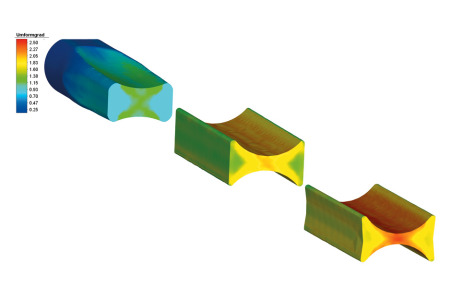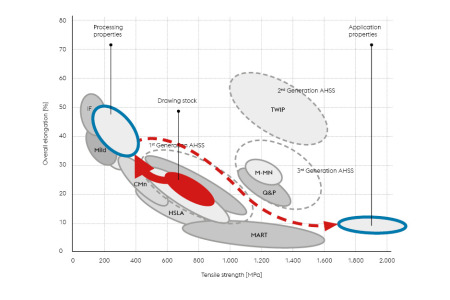With our individually tailored wire solutions we can meet your demands and your customers' requirements. As well as digital product simulations, our unique R&D set up means we can offer the option of individual product development with substantially reduced development times, considering material and process development from steel to the drawn wire, our R&D team guarantees optimised product properties for the subsequent processing and use of your products. That complete package guarantees you Performance in Innovation.
To meet present and future market demands, we have a well trained and highly motivated team of developers, researchers and product managers at the disposal of our customers, who understand the requirements you place on our products and can infer the relevant product features ensuring an optimised process chain that is supported by the very latest analysis, simulation and process technology. In that way we can ensure that your demands are implemented.
Virtual Product Development

We think holistically.
In many cases, a new alloy concept is created virtually on a computer.
Cooperative partnerships with universities and research establishments ensure access to current knowledge and the scope to design products from the atomic level upwards right through to forming processes and application properties.
Steel Development
In our MetLab (Metallurgy Laboratory) and TechMet (Technical Centre for Metallurgy) facilities we can offer our customers two globally unique research facilities which can verify and innovate new alloys on a smallest possible scale. Individual compositions can be produced in a very short time. MetLab can provide lab samples for pilot testing from 8 kg up to 50 kg. On that basis TechMet can cast individual 5-tonne billets for verifying the processing capability in the hot-rolling mill and providing initial customer samples.
Wire Development

The development processes for our high-quality wire include the tuning of material and surface properties. We also continually improve not only wire forming in our rolling mill and drawing shops but also at our customers, who subsequently process the wire into complex products.
Another focal point of our development work is finding the right balance between processing and application properties according to customer requirements.
Wire Technology Centre
Robots and high-speed cameras dominate the Wire Technology Centre. Material, surface and forming create the framework within which the product is further researched and developed. A coating robot which can automatically apply a laboratory designed coating or carry out pickling or cleaning tests, is responsible for surface optimisation, for example: While forming on a fully instrumented drawing machine various measuring systems such as eddy-current testers, high-speed cameras and vibration-measuring equipment are used. That means that in-line testing can be set up from the start without the need to intervene in ongoing production.
Application Engineering and Basic Principles
Our research and application engineering team has an in-depth understanding of material properties and the physical and chemical requirements of your products. Support in mastering the challenge is provided by our in-house testing facilities and extensive research network.
Key Research Areas:
- Surface finishes
- Heat treatments, phase transitions and metallographic microstructures
- Coatings, zinc, lubricants
- Wire cleaning, descaling, pickling
- Wire straightening, internal stresses
- Optimizing steel compositions and controlling processes to attain specific properties
- Developing new methods of inline crack detection on the wire
We are very happy to work together with many research laboratories and universities:
- Montanuniversität Leoben
- University of Technology, Graz
- CDL - The Christian Doppler Laboratory
- MCL - Material Center Leoben
- European Community Projects
- Brite Euram
- RFCS (formerly EGKS)
Your Benefits
- Product portfolio expansion
- Collaborative material development
- Custom-made alloy concepts
- Shorter time to market for newly developed products
- Laboratory casting formats comparable to large-scale technical plants
- Easy transfer to serial production
- Supply of samples in the form of utility models
